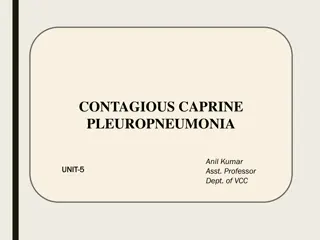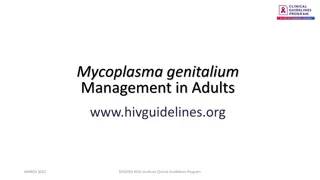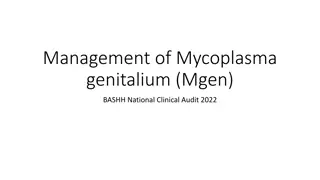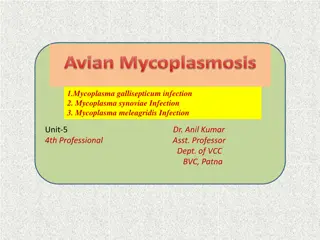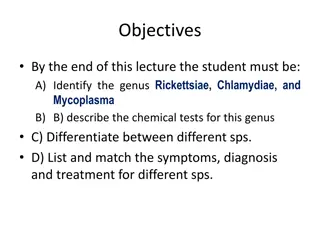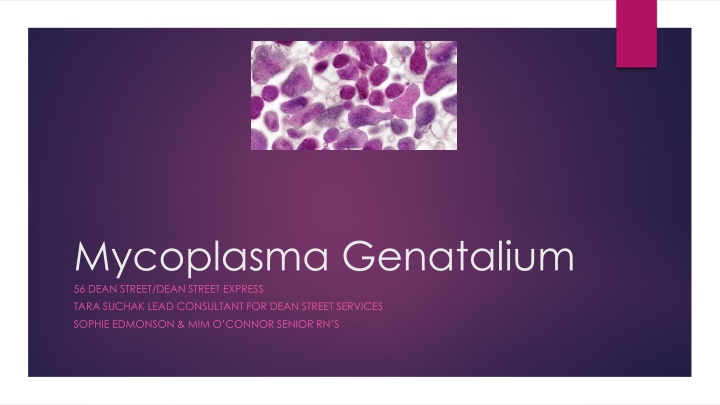
Mycoplasma Genatalium
Learn about Mycoplasma genitalium (Mgen), a sexually transmitted bacterium, including its transmission, prevalence, symptoms, testing methods, challenges in treatment, and recommendations for partners of affected individuals.
Download Presentation

Please find below an Image/Link to download the presentation.
The content on the website is provided AS IS for your information and personal use only. It may not be sold, licensed, or shared on other websites without obtaining consent from the author. If you encounter any issues during the download, it is possible that the publisher has removed the file from their server.
You are allowed to download the files provided on this website for personal or commercial use, subject to the condition that they are used lawfully. All files are the property of their respective owners.
The content on the website is provided AS IS for your information and personal use only. It may not be sold, licensed, or shared on other websites without obtaining consent from the author.
E N D
Presentation Transcript
Mycoplasma Genatalium 56 DEAN STREET/DEAN STREET EXPRESS TARA SUCHAK LEAD CONSULTANT FOR DEAN STREET SERVICES SOPHIE EDMONSON & MIM O CONNOR SENIOR RN S
What is Mycoplasma Genitalium? Mycoplasma genitalium (or M.Gen) is a sexually transmitted bacterium, first discovered in 1981. It can be found in the genital tract urethra and vagina. It can be found in the rectum and throat but MUCH less commonly
Prevalence 1 2% of population have M.Gen at any one time. In STI Clinic attendees prevalence ranges from 4-38%! Risk of transmitting it via sex is less than for chlamydia. (risk of passing on chlamydia from one episode of sex is about 35%)
How M.Gen is transmitted? M.Gen is transmitted through unprotected penetrative vaginal and anal sex. It cannot be caught through kissing, hugging or toilet seats. The incubation period for M.Gen is 1-3 weeks after initial contact. Mycoplasma Genitalium (Mgen): Symptoms, Testing, and Treatment | Patient
Testing is available at most sexual health clinics, but is not recommended routinely, as most people who have M.Gen do not develop any issues. Patients with symptoms may require testing for M.Gen; after chlamydia and gonorrhea have been excluded. Symptoms include: Dysuria (pain passing urine) Discharge Pelvic pain Post-coital bleeding (Bleeding after sex)
Symptoms Majority of cases are asymptomatic and clear without treatment. People with penile discharge and/or dysuria, approximately 10-15% will test positive for M.Gen. People with pelvic pain and bleeding after sex, approximately 5-10% will test positive for M.Gen. (So even if you have these symptoms its unlikely to be due to M.Gen)
Problem with Treating M.Gen Majority of people who have M.Gen do not go on to develop disease. Current treatments are imperfect Lead to antibiotic resistance Test of Cure (TOC) is advised at 6 weeks although may be revised to 3-4 weeks 21% still positive on TOC
Contacts of Mgen? Regular partners of anyone diagnosed with M.Gen should be tested and treated with the same medication. THIS IS TO PROTECT THE INDEX PATIENT NOT THE PARTNER There is no indication to treat anyone who they will not have sex with again.
Asymptomatic Testing YOU DON T NEED TO BE TESTING FOR M.Gen routinely if you have no symptoms (Clinics may test IF you have symptoms, and Chlamydia and Gonorrhoea are negative)

